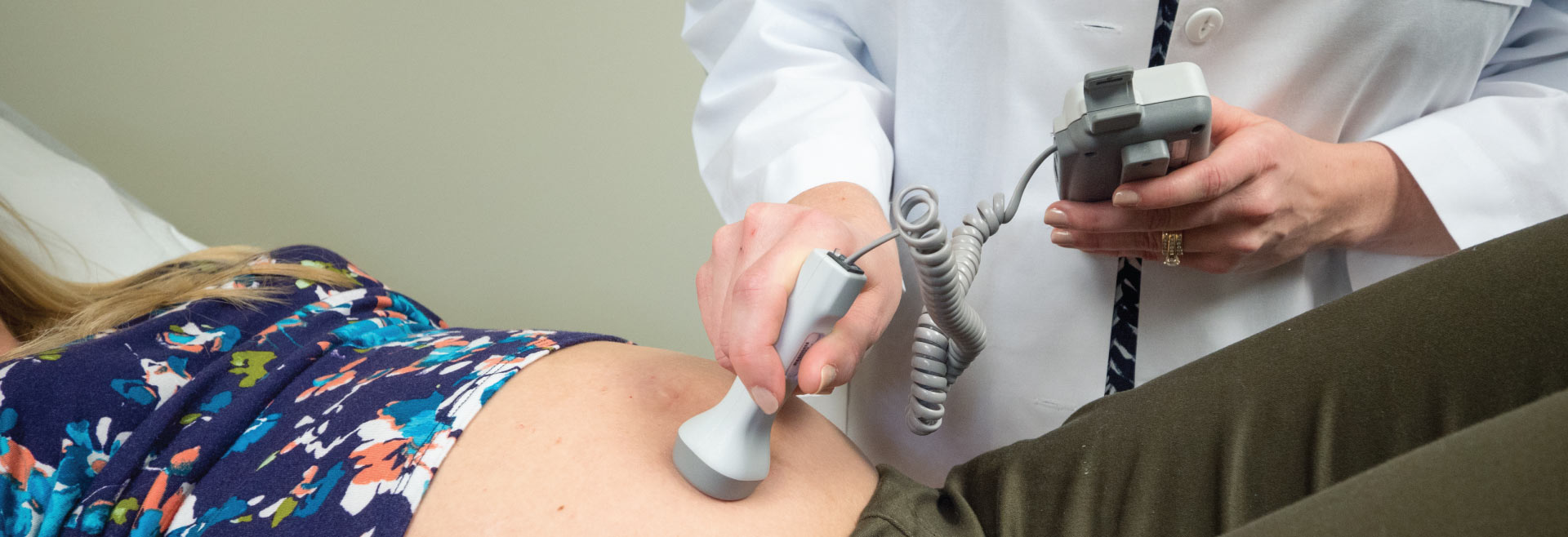The blessing of pregnancy may come with a whirlwind of emotions. You may be feeling excited, nervous, joyful, anxious, and a host of other emotions, all of which can be amplified by the news that it will be a high-risk obstetrical. At this point as a mommy-to-be, you are probably trying to learn as much as possible about what to expect over the next few months. Keep it up! Preparing for what comes next is important and even more so when it comes to high-risk pregnancies.
What does it mean to have a high-risk pregnancy?
A pregnancy is considered high risk if, at any point during the pregnancy, the life of the mother or baby is threatened. A high-risk pregnancy often requires more specialized care for the mother and the baby. There are various factors, for the baby and the mother, that can lead to a pregnancy being designated high-risk, such as:
For Baby
- The potential for premature birth, which increases the likelihood of health complications.
- Defects or conditions found during prenatal testing which may, or may not, endanger the baby’s life.
For Mother
- Some pregnancies develop into high-risk pregnancies due to symptoms and physical changes that occur as the mother progresses through her pregnancy.
- The existence of the mother’s pre-existing health conditions, which may increase potential risks during pregnancy.
- Serious health issues that can threaten the life of the mother, or her baby, or are known miscarriage risks such as advanced maternal age, obesity, high blood pressure, blood clotting disorders, thyroid disorders, diabetes, etc.

What exactly causes a high-risk pregnancy?
Complications during a previous pregnancy may increase your risk with subsequent pregnancies. These prior complications will cause your doctor to monitor your progress more closely. Pre-existing health conditions may also cause a pregnancy to be classified as high-risk from the very beginning. If the following conditions have affected you make sure you speak with your doctor, as they may negatively affect your pregnancy.
- Blood disorders like sickle cell disease or clotting disorders
- Chronic kidney disease
- High blood pressure or preeclampsia
- HIV or AIDS
- Lupus
- Maternal age over 35 years old
- Obesity
- Thyroid conditions-Hyperthyroid or Hypothyroid
- Type 1 or Type 2 diabetes
- History of preterm labor or birth
- History of uterine surgery such as multiple cesarean sections or myomectomy
Today, there is plenty of information warning against unhealthy lifestyle habits and highlighting the adverse effects they may have on your life. Smoking, alcohol consumption, and substance abuse are common lifestyle choices that can negatively affect a pregnancy. Smoking increases the likelihood of giving birth to a preterm baby and could result in a low birth weight. Fetal exposure to alcohol can cause serious harm or even death of the infant. Substance abuse may affect a developing baby in a variety of ways, causing preterm delivery, neonatal dependency, neonatal withdrawal, developmental delays and other birth defects.
Does my prenatal care differ because I’m a high risk?
A high-risk pregnancy will surely necessitate more frequent prenatal visits and close monitoring, but the difference in prenatal care will be entirely dependent upon the circumstances. If a condition is serious enough it may be necessary to be referred to a Maternal-Fetal Medicine doctor for specialty care. West Des Moines OB/GYN refers these cases to Dr. Neil Mandsager and Dr. Jona Conklin at the Perinatal Center of Iowa.
Questions To Ask Your OB/GYN
What specific factors make my pregnancy high risk? Should I be seen by a specialist?
Finding out what makes you at higher risk can help you understand what additional care and monitoring you may need throughout your pregnancy and delivery. The doctors at West Des Moines OB/GYN Associates are happy to explain what factors have led to a high-risk designation and whether you will need to be evaluated by a specialist.
How long has this office been open?
It may feel that there are several unknowns when it comes to a high-risk pregnancy. It may be comforting for you to know that an office is well established and that your doctors have plenty of high-risk obstetrics experience. West Des Moines OB/GYN Associates has been in practice for over 25 years.
How many doctors will I see?
At West Des Moines OB/GYN Associates your visits will alternate between all of the doctors in the group, so that you may become familiar with each doctor. Getting to know each doctor personally creates comfort and confidence when it is time to deliver your baby. All of the doctors cycle through a rotation of “on-call” duties and perform deliveries regularly. To ensure we provide the best care possible, there may be some high-risk cases in which we restrict care to 2 or 3 physicians.
Who is available for call-in questions?
You want to know that your questions will be answered when they arise. Ask what number you should call for questions and who you’ll be speaking with. West Des Moines OB/GYN offers dedicated OB call-in nurses at 515.223.5466 during the following daytime hours:
- 8:30 a.m. – 4:30 p.m. Monday – Thursday
- 8:30 – Noon Friday
- After-hours and weekend emergencies are directed to the “on-call” doctor
Is there a number for off-hours problems and emergencies?
Sometimes you’ll have questions or concerns arise outside of normal business hours. Ensure that there is a number you can call after hours and how to notify your doctor in case of an emergency. At our office, if you have an emergency after hours, the on-call physician can be reached by calling 515.223.5466 and pressing “9”. If you are unable to reach a physician and you have a real emergency, please go to the emergency room. The physician will return your call as soon as possible.
What high-risk conditions do they treat?
If you’re a first-time mother or are looking for a new OB/GYN office, you may want to know that your new physician has experience with high-risk pregnancies. All of our practitioners are Board-Certified in Obstetrics and Gynecology which includes high-risk pregnancy care, often in coordination with a Maternal-Fetal Medicine specialist. Our high-risk obstetrical care includes but is not limited to:
- Twin gestation
- Hypertension/Preeclampsia/Eclampsia
- Gestational Diabetes
- Advanced maternal age
- Preterm labor
- History of incompetent cervix
- Pre-existing maternal conditions
- Heart disease including essential hypertension
- Respiratory disease including asthma and pulmonary embolism
- GI disease including Crohn’s and Celiac disease
- Hematologic conditions including Sickle Cell disease and clotting disorders
- Pre-existing diabetes type 1 and type 2
With which hospitals are they affiliated?
Maybe you have a specific hospital at which you wish to deliver. Or you just want to know that the hospital is well-equipped for high-risk pregnancies. You should find out which hospitals your OB/GYN delivers at and whether that fits your birth plan. West Des Moines OB/GYN Associates performs all deliveries at the main campus of Mercy Medical Center, which is the safest and best-equipped facility to handle a high-risk delivery. Mercy Medical Center is a level 4 facility for Obstetrics with a dedicated Obstetrics Emergency Department.
This campus also has a level 4 Neo-natal Intensive Care Unit (NICU) to assist with any special treatment a baby may require after birth.
How often will I get to meet with the doctor face to face?
Each high-risk case requires individualized care. Typically, the frequency of appointments will increase as the patient reaches the third trimester, at which point visits might be weekly or twice weekly. If there is a problem or concern, we will always prioritize our patients’ needs.
Will my treatment be individualized or will set protocols be followed?
Your pregnancy is unique and you want to know that your care will be individualized to your specific needs. West Des Moines OBGYN will individualize your care plan every step of the way. All of our Board-Certified physicians follow the recommendations put in place by the American College of Obstetrics and Gynecology, and the Society for Maternal-Fetal Medicine. For high-risk pregnancies, we may coordinate your care with local Maternal-Fetal Medicine physicians.
What procedures are done at the clinic/office? Which procedures take place in a hospital or ambulatory center?
You’ll likely be meeting with your physician more often with a high-risk pregnancy, and you may want to know where you’ll be traveling for your appointments. Whether it’s for your commute or your comfort, find out where different procedures you may need will take place. We perform 3D/4D Fetal Ultrasound, Non-stress Tests, Biophysical Profiles, and optional genetic testing, including Cell-Free DNA Testing, in our office. A referral to Maternal-Fetal Medicine would be made for Chorionic Villus Sampling, Amniocentesis, and further invasive testing and treatment.
Why Choose West Des Moines OB/GYN Associates?
At West Des Moines OB/GYN, we pride ourselves on providing individualized care plans for all our patients. From preconception to postpartum, we will care for your baby, your body, and your mind. Whether you’ve had a previous high-risk pregnancy or are a first-time expecting mother, your pregnancy is unique and we want to be sure all your questions are answered and concerns heard. Our priority is you and your baby. Schedule an appointment today and experience the difference.


